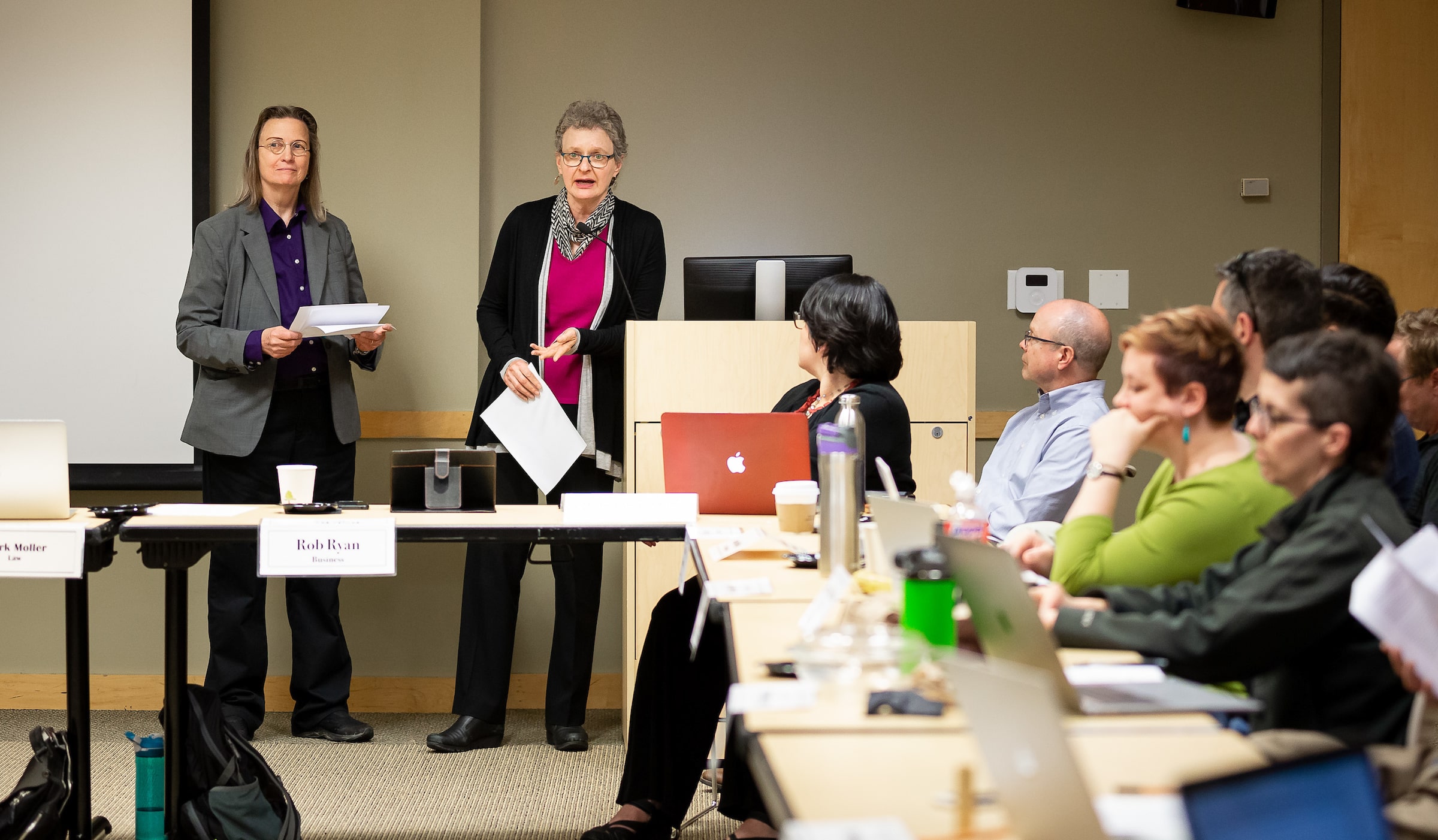 Mary Ann Papanek-Miller, professor and department chair of the Department of Art, Media, and Design, left, and Caryn Chaden, associate provost for student success and accreditation, present the final report of the Quarter to Semester Exploratory Task Force to Faculty Council on June 5. (DePaul University/Jeff Carrion)
Mary Ann Papanek-Miller, professor and department chair of the Department of Art, Media, and Design, left, and Caryn Chaden, associate provost for student success and accreditation, present the final report of the Quarter to Semester Exploratory Task Force to Faculty Council on June 5. (DePaul University/Jeff Carrion)
They studied the higher education landscape, collected data, analyzed potential effects and reported the pros and cons of academic calendars using quarters and semesters. In the end, the 13-member Quarter to Semester Exploratory Task Force found benefits to both.
“There is no best system,” says Caryn Chaden, associate provost for student success and accreditation and task force co-chair.
Currently, 95 percent of the nation’s public and private nonprofit universities use the semester system. Meanwhile, about 75 percent of for-profit universities use quarters or another system.
Chaden and co-chair Mary Ann Papanek-Miller, professor and department chair of the Department of Art, Media and Design, shared the task force’s
final report this month and made all supporting documentation available to the university community.
According to the report, semesters would better align DePaul with universities in an era when many students transfer schools at least once before earning a degree, while quarters help students balance multiple responsibilities, like work and family.
The task force found scant data assessing the effectiveness of either system. However, the report itemized perceived benefits and disadvantages:
- Semesters can provide students more time for in-depth focus on course content, while quarters typically allow students to take eight more courses over the span of their degrees.
- Semesters can provide students who falter more time to recover during the term, yet quarters can provide students who have failed a course a shorter path to getting back on track.
- Semesters require fewer start and stop times across the year, reducing administrative needs, yet quarters allow students more flexibility in scheduling and incorporating minors or second majors into their curriculum.
- Semesters may allow more time for students to develop course-specific skills and ideas, especially when they engage in internships or study abroad, yet quarters may provide an intensity of experience that semesters sometimes lack.
Task force members interviewed administrators at universities and systems that have made or considered an academic calendar transition. They noted the exercise provided “an opportunity for all corners of the institution to reflect on their curriculum and business practices at once,” according to the report.
In a brief presentation to Faculty Council, Chaden said the task force received about 2,000 comments during its examination of each calendar system, many from students.
“Students spoke about their lives and the things that are important to them,” she says, noting her surprise at how significant a factor not having class on Fridays is for them and their need for flexibility in their schedules. Survey results reported undergraduates most strongly preferred quarters.
The DePaul Academic Advising Network reported the most support for the semester system because it allows more time to get back on track if the semester does not start well, offers a slower pace and one less exam period, and makes it easier for students to transfer credits. Staff had no strong preference, while faculty strongly preferred quarters, though with some variation across colleges.
Now that the task force has concluded its work, the full report and supporting documentation will be reviewed carefully and a determination on next steps will be made and communicated to the campus community.